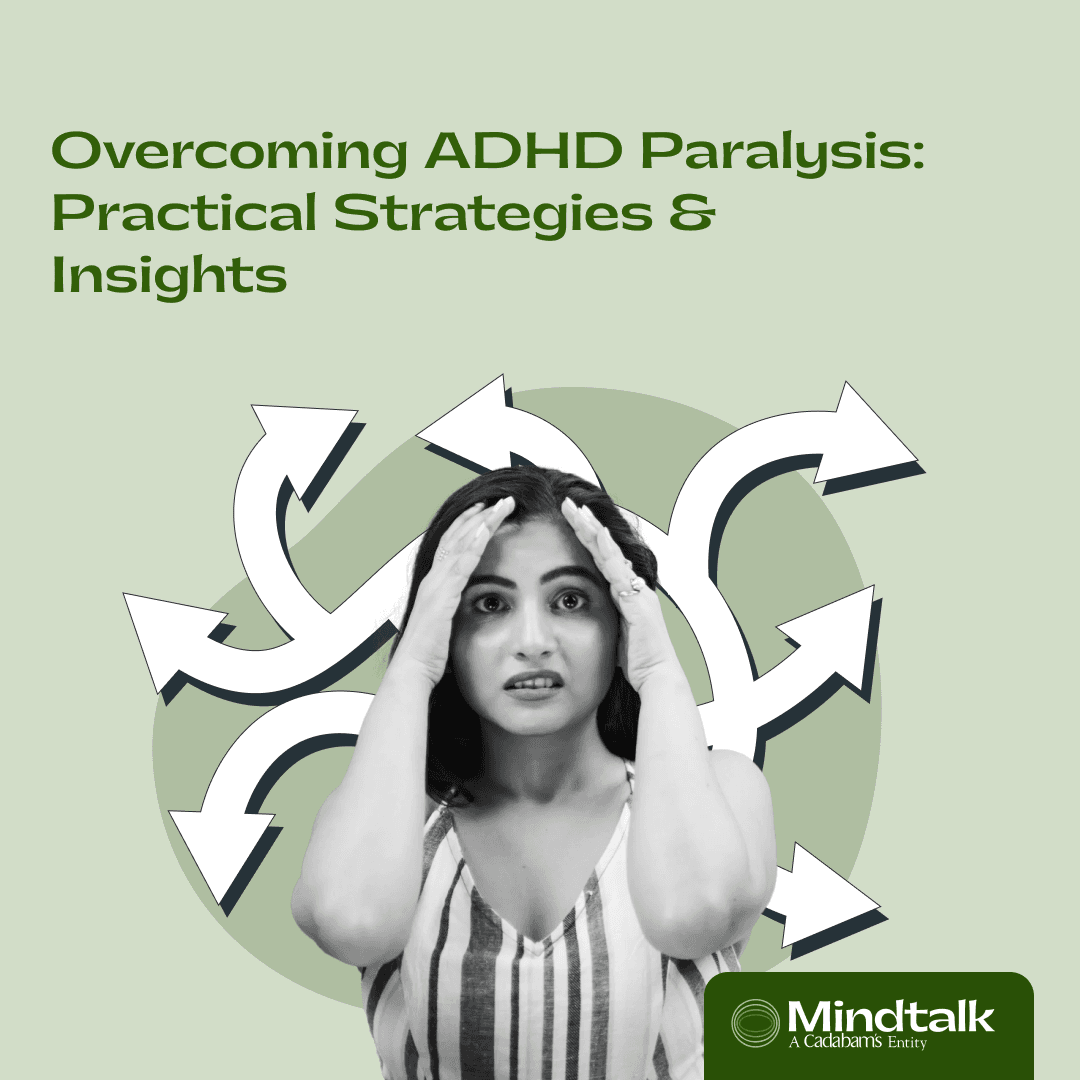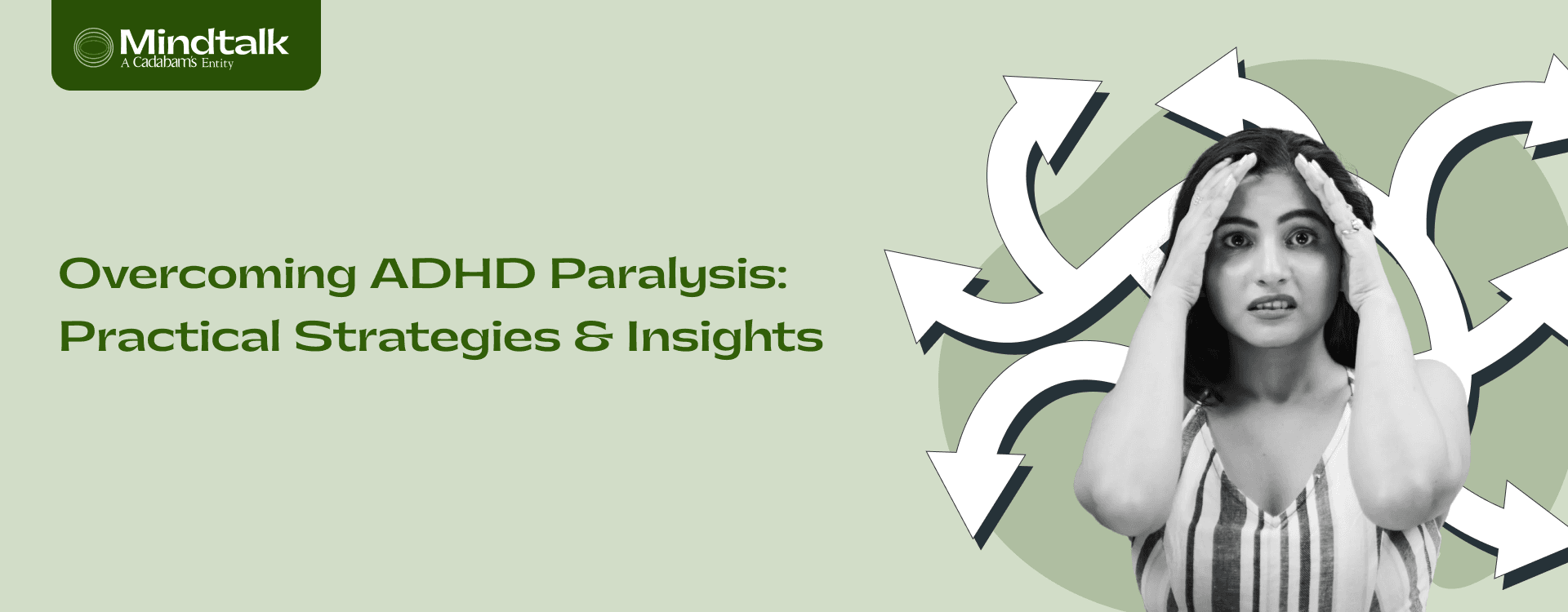ADHD Paralysis Explained: Symptoms and Solutions

It doesn’t matter if you are a master of focus or drift away into daydreaming often. This blog is for everyone. Let’s explore and understand ADHD Paralysis and how you can overcome this condition to lead a happy and fulfilling life.
What Is ADHD Paralysis?
ADHD paralysis, also known as Analysis Paralysis or Decision Paralysis, is a mental quicksand; it freezes you, leaving you staring at all the pending works making you feel trapped in your own mind. This sensation of being overwhelmed with multiple tasks can reach a point where initiating any action becomes challenging.
ADHD Paralysis Vs. Procrastination
We all procrastinate sometimes, but occasionally, we tend to get confused with the symptoms of analysis paralysis with procrastination, but they’re not similar.
In simple terms, non-ADHD procrastination means intentionally delaying work, as it may not be the priority (right now).
On the other hand, analysis paralysis is a neurodevelopmental disorder that affects the brain's executive functions. It makes it harder for individuals to process information, creating a state of confusion about where and how to start anything, resulting in inaction.
Types Of ADHD Paralysis
Decision Paralysis is categorized into three distinct types, and an individual with this disorder may experience one or multiple categories throughout their lifetime. These distinct types are:-
ADHD Task Paralysis
When a person experiences this condition, even initiating a small task feels like climbing over a hump leading to zoning out and fidgeting. The condition even forces the person to do something to evade instituting the work. It is like having too many windows opened in your mind’s browser, each competing for your attention. Under this condition, starting a task may trigger anxiety about failure, which may contribute to a sense of demotivation.
ADHD Mental Paralysis
In ADHD mental paralysis, your mind feels overloaded and foggy, which makes it difficult for you to think clearly or even remember things you were just doing. It is a state of mind where the overwhelming tasks evoke executive function freeze, leaving you feeling stuck and unable to act or take action. Consequently, procrastination, avoidance, and guilt become a constant feature in your daily life.
ADHD Choice Paralysis
When faced with multiple options, dopamine ripples in your brain with wonder and excitement, and the brain kicks into hyperactive mode, thus making every decision feel monumental, leading to overthinking and ultimately landing on no decision at all. This abundance of options spurs anxiety about making the wrong choice.
What Are The Symptoms Of ADHD Paralysis?
While the symptoms of ADHD paralysis can be exemplified in different forms in different people, some of the most common symptoms include:-
- Indecisiveness
- Overthinking or overanalyzing
- Inability to focus
- Sudden mood swings
- Uncertainty
- Poor time management
- Dilly-Dallying
- Brain fog
Triggers Of ADHD Paralysis
Now you know what ADHD paralysis is and what its symptoms are. So, let's dive a bit deeper and understand some of the most common triggers that cause the condition.
Overstimulation
For individuals with ADHD, too much inflow of information exceeds the limit of their sensory input, leading to overstimulation. This constant bombardment of information can stress the individual and make it impossible to focus on daily life. People with ADHD experience emotional constraints and impetuousness, causing them to react strongly to factors such as taste, noise, texture, sights, smell, etc.
Emotional Dysregulation
A person going through this condition often finds it difficult to regulate their emotions due to dysfunctions in brain areas that are related to emotional processing. These emotional feelings include difficulty identifying their own emotions and feeling lost amidst anger, sadness, or frustration. It can also affect their ability to empathize and understand others' emotions, leaving them feeling misunderstood.
Perfectionism
While yearning for flawlessness in all we do is normal, relentlessly striving for it becomes unhealthy. This excessive pursuit exceeding even situational demands can be a significant trigger for individuals with analysis paralysis. Perfectionism isn’t about trying to do things perfectly but getting stuck in the process, consequently making things harder to finish on time.
Diagnosing ADHD Paralysis Tests
While ADHD Paralysis is not officially a diagnosable condition, it is a real syndrome with recognizable symptoms that can be assessed through evaluations and tests, which may include:-
- Cognitive Testing: It is a professional test that measures various cognitive functions, such as memory, attention, and executive skills. Tests like the Wechsler Adult Intelligence Scale (WAIS) can sufficiently distinguish a person with and without ADHD.
- Medical and Neurological Examination: It helps to rule out any other medical conditions that simulate ADHD symptoms.
- Clinical Interviews: These involve mental health professionals who delve into your academic/ personal/ family history, symptom severity, etc, to understand and differentiate ADHD from other conditions.
Strategies To Overcome ADHD Paralysis
Analysis Paralysis is a type of condition that feels like a never-ending cycle. The more inactive the individuals are, the more challenging it becomes to get out of the cycle. But there are ways to break free from it. So, let’s discuss some of the techniques.
Practical Tips And Techniques
- Write all thoughts and ideas on paper to free some space in your mind. It will help you organize your thoughts and help you remember what you need to achieve each day.
- Keep your work plan easy and achievable by scheduling a specific duration for a specific task.
- Instead of going for perfection, go for completion, as processing too much info in detail may leave you overwhelmed.
- Instead of sticking to mundane tasks, integrate activities you love into your routine to ease tension and clear your mind.
Lifestyle Changes And Support Systems
- Incorporate nutritious meals in your routine as it will improve brain and nerve cell functioning.
- Make sleep a priority, and try to get at least 7-8 hours of sleep.
- Make exercise part of your daily life. Even a 30-minute leisure walk may do wonders.
- Reduce the loop of worry and anger through relaxation techniques such as meditation, yoga, deep breathing, etc.
When To Seek Professional Help
When you are juggling a million balls in this fast-paced life, it is natural to feel overwhelmed, forget things, or lack concentration. But if these feelings are persistent to a point where they begin causing significant distress in life, this might be a sign to seek professional help.
Overcome ADHD Paralysis With Mindtalk
On your journey to overcome ADHD paralysis, Mindtalk can be your starting point of learning, growing, and self-discovery. At Mindtalk, we offer a comfortable and safe environment with a community of mental health professionals who understand your challenges. With a comprehensive range of medical examinations, psychotherapy, and coaching, Mindtalk can help you take control of your story. So begin your partnership with Mindtalk for a happy and fulfilling life.










